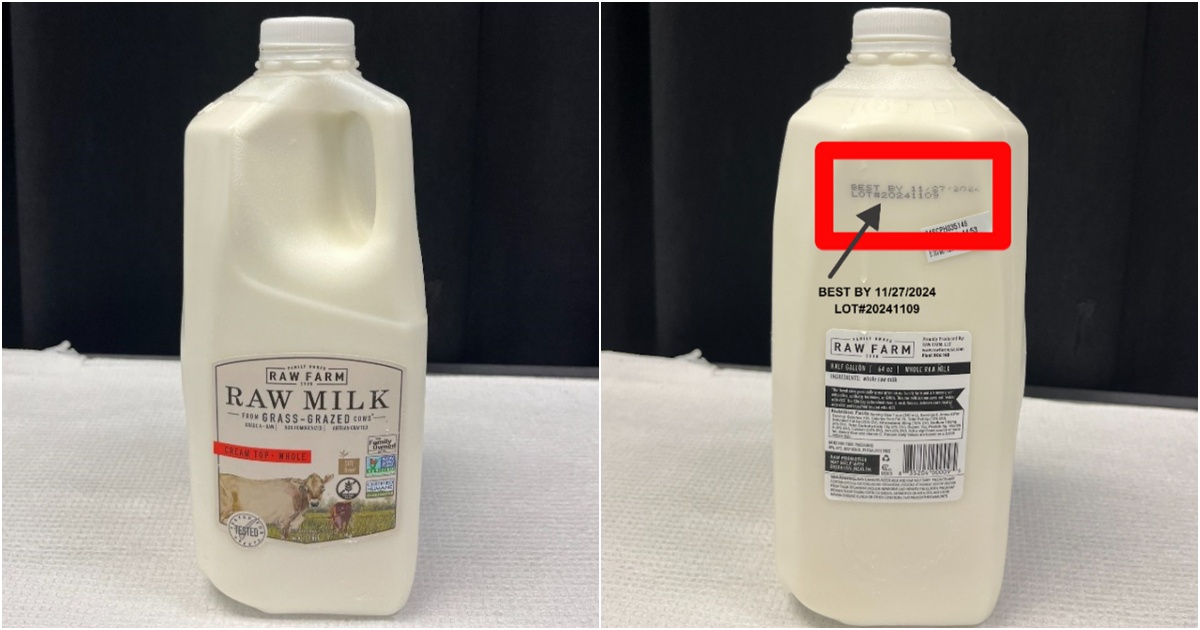The California Department of Public Health (CDPH) has sounded the alarm after detecting bird flu virus in a retail sample of raw milk produced by Raw Farm, LLC in Fresno County.
This urgent advisory follows the detection of the bird flu virus in a retail sample, leading the company to issue a voluntary recall for the product bearing lot code 20241109 with a Best By date of 11/27/2024.

While no illnesses have been reported in connection with this contaminated batch, the CDPH is taking no chances. Consumers are advised to return any remaining product to the point of purchase immediately. Retailers have also been instructed to remove the affected raw milk from their shelves.
The County of Santa Clara Public Health Laboratory, acting as a second line of defense for consumer safety, detected the bird flu virus in a sample of raw milk purchased from a local retailer.
This finding was subsequently confirmed by the California Animal Health and Food Safety Laboratory System.
More from the press release:
Public health experts have long warned consumers against consuming raw milk or raw milk products due to elevated risks of foodborne illness. Outbreaks due to Salmonella, Listeria monocytogenes, toxin producing E. coli, Brucella, Campylobacter, and many other bacteria have all been reported related to consuming raw dairy products. Raw milk products are not pasteurized, a heating process that kills bacteria and viruses such as bird flu.
Pasteurized milk and milk products are safe to consume because the heating process kills pathogens, including bird flu, that can cause illness.
Drinking or accidentally inhaling raw milk containing bird flu virus may lead to illness. In addition, touching your eyes, nose, or mouth with unwashed hands after touching raw milk with bird flu virus may also lead to infection. Symptoms of bird flu infection in humans include eye redness or discharge, cough, sore throat, runny or stuffy nose, diarrhea, vomiting, muscle or body aches, headaches, fatigue, trouble breathing and fever. Anyone who has consumed these specific products, and is experiencing these symptoms, should immediately contact their health care provider or local health department.
California Regularly Tests Raw Milk
As part of the state’s bird flu response, testing of raw milk from dairies has been increased to help prevent raw milk consumers from getting the virus. Once bird flu was found in California dairy herds, the California Department of Food and Agriculture (CDFA) began weekly testing of raw milk in bulk tanks.
In response to this positive test from a retail milk product, CDFA followed up with testing at both of Raw Farm LLC’s locations—results were negative for the virus—and now will begin testing for bird flu twice per week.
Pasteurized Milk is Safe to Drink
Pasteurized milk is safe to drink. Pasteurization, one of the most significant scientific food safety discoveries in human history, is the process of heating milk to specific temperatures for a certain length of time to kill many microorganisms and enzymes that lead to spoilage and illness.
Pasteurization kills the bird flu virus and other harmful germs that can be found in raw milk. CDPH advises consumers not to drink raw milk or eat raw milk products due to the risk of foodborne illnesses.
This new development comes after the Centers for Disease Control and Prevention (CDC) confirmed the first-ever case of avian influenza A(H5N1), commonly known as H5N1 bird flu, in a child in the United States.
The young patient, a resident of California, reportedly experienced mild symptoms and has since been recovering following treatment with flu antivirals.
The initial specimen collected showed low levels of the H5N1 virus, but follow-up testing several days later revealed no trace of the bird flu virus. However, the child tested positive for other common respiratory viruses, suggesting a mixed infection, according to the CDC.
Read more:
Here We Go: CDC Confirms First-Ever Case of H5N1 Bird Flu in a Child in the U.S.















